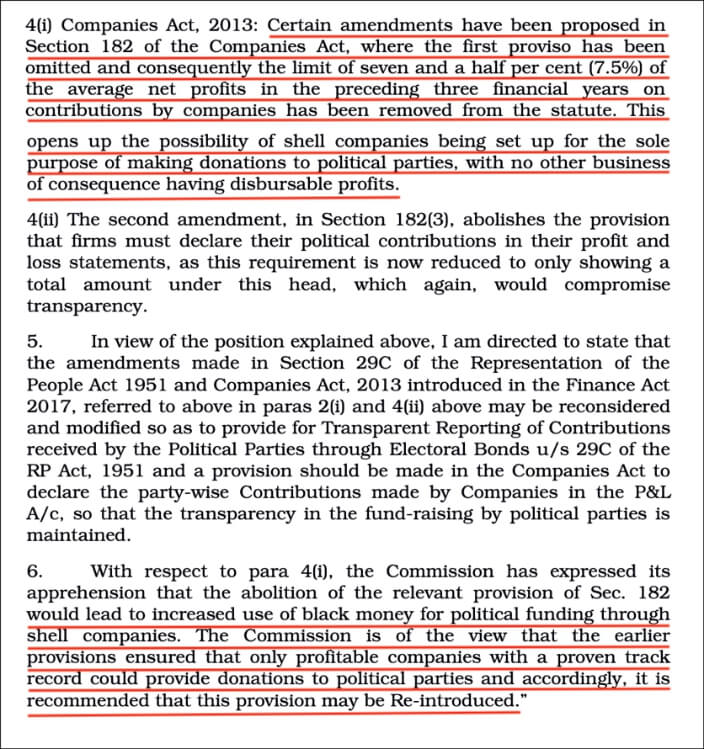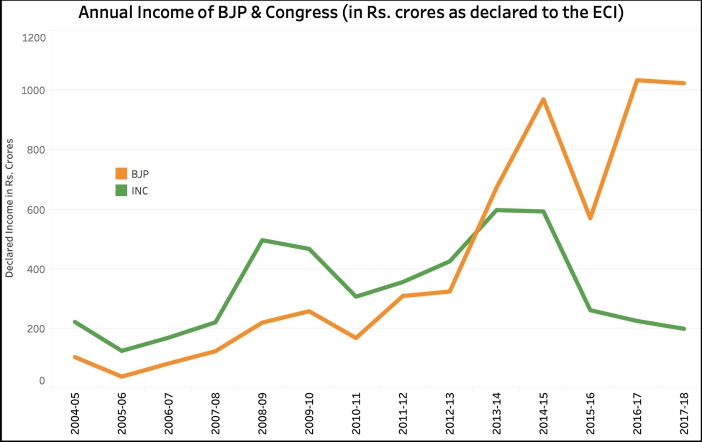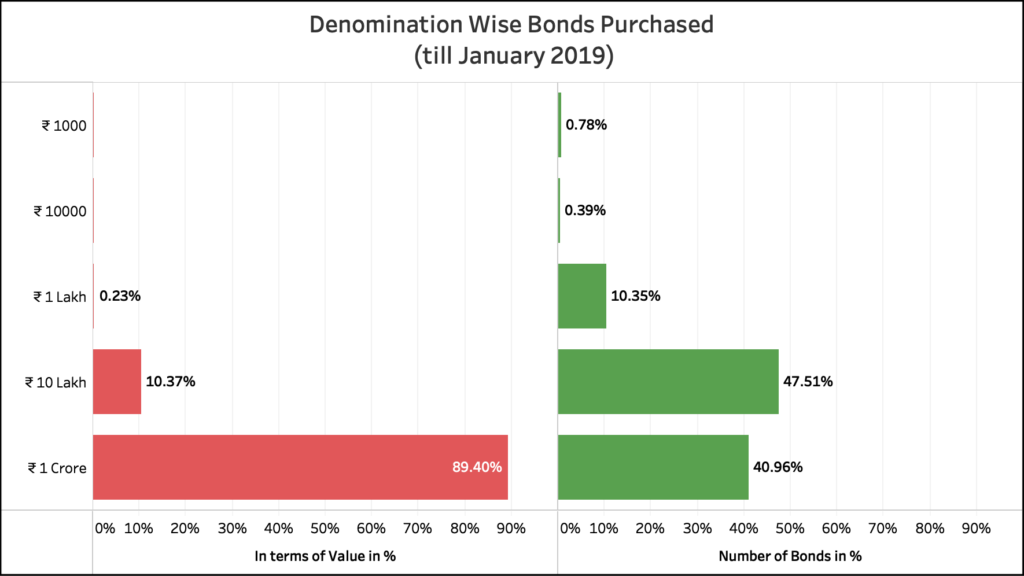[orc]Following the Supreme Court’s interim directions on ‘Electoral Bonds’, there has been an intense debate about the issues with electoral bonds. Here is a primer.
The Supreme Court (SC) had recently passed interim directions on the issue of ‘Electoral Bonds’ that mandates political parties to disclose in a sealed cover to the Election Commission of India (ECI), the names of donors of these bonds by 30th May, 2019. But what’s wrong with electoral bonds? Here is a look at all the issues. (Watch this video to learn more about the Political Funding in India)
What are the issues Electoral Bonds?
Electoral Bonds are bearer banking instruments that can be used to donate to political parties. One can read this Factly article to understand in detail about the electoral bond system. The biggest issue with electoral bonds is the anonymity. Except the banking system or the SBI (hence the government), the donor & the political party, nobody else would know the identity of the donor. This anonymity is a perfect recipe for quid pro quo with governments. The finance minister has argued in support of these bonds saying that the bonds will eliminate black money in elections and ensure only clean money is used. He also went onto say that anonymity is important to donors since they fear consequences. Let’s examine each of these issues.
Are Cash donations not allowed after the advent of Electoral Bonds?
Through the Finance Bill of 2017, the limit for cash donations was reduced to Rs. 2,000 from the existing Rs. 20,000. This limit is only for the purpose of political parties seeking exemption from Income Tax. In other words, if parties receive any amount more than Rs. 2,000 from a single donation in cash, that excess amount will not be eligible for any tax exemption. Any amount above Rs. 2,000 has to be received through the formal banking system or through the electoral bonds. While this is a welcome move, parties can overcome this rule by simply dividing cash donations into multiple chunks of Rs. 2,000. And secondly, section 29C of the Representation of People Act, 1951 has not been amended accordingly. In other words, the names of donors (other than those in the form of electoral bonds) have to be disclosed by political parties only if the donation exceeds Rs. 20,000.
What is the impact of Electoral Bonds on Black Money?
The finance minister’s argument has been that since the bonds have to be purchased through the formal banking system, black money cannot be used to purchase these bonds. It is pertinent to note that the finance minister had on multiple occasions said that ‘Black money does not change its colour merely because it is deposited in bank’, in the context of money returning to banks after demonetization. The same logic applies for electoral bonds as well, especially with the amendments made to the Companies act through the Finance Bill of 2017.
Through these amendments, the government has removed the existing cap of 7.5% of the average net profits of the preceding three financial years for donations to political parties. Even the ECI, in its affidavit in the Supreme Court opined that this opens up the possibility of shell companies being setup only with the purpose of donations to political parties. The ECI also felt that this would also lead to increased use of black money for political funding through shell companies.

- Hence the argument that the bonds eliminate the use of black money in politics does not hold any water. It is entirely possible that shell companies be setup only for the purpose of routing black money to political parties through electoral bonds.
- It may be argued that the relevant government agencies can investigate these shell companies. While it is possible, why would political parties antagonize the very people who donated to them?
The Anonymity argument
The finance minister also argued that donors are discouraged to donate to political parties because of the fear of consequences and that electoral bonds provided the much needed anonymity. In fact, it is the opposite. The anonymity provided by electoral bonds is a perfect recipe for ‘quid pro quo’. Parties that come to power can extend benefits to their donors without anyone having a whiff of wrongdoing. In fact, consequences if any or vendetta of any government is better countered through greater transparency and not anonymity.
In fact, as per the International Institute for Democracy and Electoral Assistance (IDEA) report, political parties and candidates must reveal the identity of donors in more than 80% countries across the Americas, Europe & Asia. Such disclosure is a norm in most of the matured democracies.
Parties in power always Benefit
As per data submitted by political parties to the ECI and analysis by the Association for Democratic Reforms (ADR), it is clear that the party in power always mops up more donations than others. The Congress declared a greater income than the BJP, every year from 2004-05 to 2012-13. In 2005-06, the Congress declared an income three times that of the BJP. The tide started turning in 2013-14, when the BJP declared a greater income than the Congress for the first time in 10 years. Since then, there has been no looking back for the BJP. In 2017-18, the BJP declared an income of Rs. 1024 crores compared to Rs. 199 crores declared by the Congress. In other words, the BJP’s declared income was 5 times that of the Congress.

Electoral Bonds would only exacerbate this problem as ruling party at the centre can access all the information about donors of these bonds. Such disparity in the income of political parties is bound to increase with the anonymity provided by electoral bonds and would vitiate the atmosphere severely jeopardizing the conduct of free and fair elections. Any political party’s ability to influence voters increases with greater access to resources. With the ever increasing role of money power in elections, these disparities might affect the level playing field as well.
Bonds designed only for Corporates
It is evident from the electoral bond sale data so far that these are designed for corporates and not individual citizens. In terms of value, more than 99.5% of the bonds purchased till January 2019 are in the denomination of 10 lakh & 1 crore. One might argue that citizens also can purchase these bonds. But the restriction on branches (one per state) and the restriction on the number of days of sale has not made it any easy for citizens to purchase these bonds.

Electoral Bonds can exist, but only with full transparency
In the quest for clean money to be used in elections, the reforms cannot be half-baked measures. If Electoral bonds have to exist, it should happen only with complete transparency where people know the identity of the donor and the party to which he is donating.



3 Comments
Pingback: The BJP's unprecedented intake of funds – including from anonymous large donors – is the single most overlooked factor in this election. | Ippodhu
Pingback: Rs 6,000-Crore Electoral Bonds Sold; Oct 2020 Audits Will Show Who Got Them | - JIFFY360.COM
Pingback: Rs 6000-crore electoral bonds sold since Jan 2018, BJP, Congress likely to release report in October - JIFFY360.COM